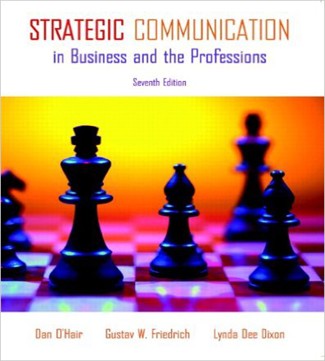Strategic Communication in Business and the Professions 7th Edition O’Hair Friedrich Dixon Test Bank
$35.00
Strategic Communication in Business and the Professions 7th Edition O’Hair Friedrich Dixon Test Bank
You will receive this product immediate after placing the order
ISBN-10: 0205693113
ISBN-13: 0000205693113 000-0205693113
TEST?BANK?CHAPTER?1
MULTIPLE?CHOICE?QUESTIONS
1. Which?of?the?following?skills?are?noted?for?being?the?key?components?of?success?in?the
business?world?
a. nonverbal?skills
b. speech??writing?skills
c. interpersonal?skills
d. oral?skills
Answer:?d?–
2. Which?of?the?communication?skills?needed?for?excellence?in?an?information?age?deals
with?employees?being?made?to?feel?that?they?can?make?a?difference?in?their?company?
a. versatility
b. vision
c. sensitivity
d. creative?insight
Answer:?c?
3. Communication?skills?are?essential?for?promoting?excellence?in?business?and?the
professions.?Of?the?four?skills?listed?below,?which?one?involves?the?capacity?to
anticipate?change?
a. versatility
b. vision
c. sensitivity
d. patience
Answer:?a?
4. Which?of?the?following?statements?best?defines?the?term?globalization?
a. It?is?the?tendency?for?all?the?organizations?in?the?world?to?become?one?big
connected?business.
b. It?occurs?when?there?is?information?overload.
c. It?means?diversity?in?the?marketplace?requiring?strategic?interdependencies
among?organizations.
d. It?is?running?the?organization?as?if?it?were?an?international?organization.
Answer:?c?
5. What?does?it?mean?to?say?that?for?communication?to?be?truly?effective,?it?must?be
interactive?
a. Communication?should?always?occur?over?an?interactive?television.
b. Effective?communication?should?always?involve?each?person?listening?and
responding?to?the?other.
c. Interactive?means?that?one?person?speaks?and?the?other?person?listens.
d. Interactive?communication?refers?to?the?physical?process?of?organizing?elements
of?the?message?for?transmission.
Answer:?b?
6. Leaving?memos?at?the?copy?machine,?trading?office?gossip?about?the?boss?while?waiting
for?the?elevator,?and?sending?confidential?files?via?electronic?mail?to?the?wrong?person
are?all?examples?of?not?considering?__________in?the?interactive?communication?process.
a. senders
b. feedback
c. encoding
d. receivers
Answer:?d?
7. The?mutual?understanding?that?results?when?the?sender?and?all?intended?receivers
interpret?the?message?in?the?same?way?is
a. shared?meaning.
b. encoding.
c. feedback.
d. noise.
Answer:?a?
8. The?process?by?which?a?receiver?translates?the?words?to?make?sense?of?a?message?they
receive?is?called
a. encoding.
b. feedback.
c. decoding.
d. entropy.
Answer:?c?
9. Which?of?the?following?communication?failures?occurs?when?a?manager?withholds
pertinent?information?from?her?subordinates?
a. poor??quality?information
b. lack?of?feedback/follow??up
c. information?overload
d. inadequate?information
Answer:?d?
10. What?is?(are)?the?primary?result(s)?of?communication?failure?in?the?business?context?
a. loss?of?morale
b. decreased?productivity
c. inefficiency
d. all?of?the?above
Answer:?d?
11. Which?of?the?following?is?a?type?of?Classical?theory?
a. human?relations?theory
b. systems?theory
c. scientific?management
d. theories?“X”?and?“Y”
Answer:?c?
12. The?classical?school?of?thought,?which?is?still?used?today?in?some?organizations,
emphasizes
a. a?high?degree?of?structure,?rules,?and?control.
b. the?interdependence?of?an?organization?and?its?environment.
c. the?intrinsic?motivation?of?employees?to?maintain?productivity.
d. the?effect?of?enlightening?on?employees’?performance.
Answer:?a?
13. A?manager?who?believes?that?harmony?should?be?encouraged,?science?of?work?and
personal?efficiency?should?be?stressed,?and?maximum?output?should?be?valued?is
following?which?organizational?theory?
a. bureaucracy?theory
b. human?relations?theory
c. human?resources?approach?theories
d. scientific?management?theory
Answer:?d?
14. A?manager?who?stresses?that?workers?will?be?more?productive?if?they?are?happy?and
are?given?the?proper?working?conditions?is?operating?under?which?organizational
theory?
a. bureaucracy?theory
b. human?relations?theory
c. human?resources?approach?theories
d. scientific?management?theory
Answer:?b?
15. According?to?McGregor,?theory?Y?holds?that?employees?basically
a. have?a?dislike?for?work?and?will?seek?to?avoid?it?if?possible.
b. will?seek?responsibility?under?the?right?conditions.
c. work?for?the?reward?of?satisfying?their?egos?or?their?self??actualization?needs.
d. are?no?different?from?theory?X?employees.
Answer:?c?
16. The?notion?that?the?whole?is?more?than?the?sum?of?its?parts?is?known?as
a. openness.
b. hierarchy.
c. synergy.
d. equifinality.
Answer:?c?
17. In?systems?theory,?the?idea?that?organizational?members?rely?on?one?another?to
accomplish?goals,?such?that?if?one?person?is?absent?or?fails?to?do?her/his?share?of?the
work?the?entire?team?suffers,?is?known?as
a. synergy.
b. openness.
c. hierarchy.
d. interdependence.
Answer:?d?
18. In?systems?theory,?for?an?organization?to?succeed,?it?should?strive?to?be?a(n)??__________
system.
a. open
b. synergistic
c. closed
d. free
Answer:?a?
19. If?two?coworkers?are?talking?about?how?the?“old??timers”?do?things,?trading?stories
about?their?first?days?on?the?job,?discussing?how?communication?works?in?the?office,
and?musing?about?those?who?have?succeeded?in?the?organization,?they?are?really
talking?about?organizational
a. values.
b. culture.
c. interdependence.
d. theory.
Answer:?b?
20. Jack?has?been?with?his?company?for?almost?two?years?and?has?not?had?an?extended
vacation.?Feeling?tired?and?experiencing?burnout,?he?asks?his?boss?(through?a?memo)
for?a?week?of?his?vacation?time.?When?Jack’s?boss?fails?to?respond?to?the?memo,?the
boss?is?engaging?in?which?element?of?the?communication?process?
a. feedback
b. channel?selection
c. shared?meaning
d. information?overload
Answer:?a?
21. Which?of?the?following?is?NOT?a?reason?for?communication?failure?
a. inadequate?information
b. information?overload
c. incompetent?communication
d. insufficient?levels?of?anxiety
Answer:?d?
22. Using?an?appropriate?channel?is?extremely?important?for?communication?exchanges?to
be?successful.?Which?set?of factors?is?most?significant?in?determining?channel
appropriateness?
a. communication?context?(physical,?social,?chronological)
b. interference?(self??generated,?environmental,?external)
c. field?of?experience?(beliefs,?values,?attitudes)
d. message?(verbal,?proxemics,?tactile)
Answer:?a?
TRUE?OR?FALSE?QUESTIONS
3. Creative?insight?refers?to?the?ability?to?ask?the?right?questions.
Answer:?True?
4. The?organizational?ability?to?create?the?future?is?called?focus.
Answer:?False?
5. A?national?attitude?is?an?attitude?that?recognizes?both?the?diversity?of?its?work?force
and?the?diversity?of?technology.
Answer:?False?
6. The?means?by?which?a?message?moves?from?source?to?receiver?is?called?encoding.
Answer:?False?
7. Context?is?the?situation?or?setting?in?which?communication?occurs.
Answer:?True?
8. Problems?with?channels?are?one?of?the?ten?reasons?listed?for?communication?failure.
Answer:?True?
9. Lack?of?feedback?is?one?of?the?ten?reasons?listed?for?communication?failure.
Answer:?True?
10. That?workers?have?an?inherent?dislike?of?work?is?an?assumption?of?the?Theory?Y
management?approach.
Answer:?False?
11. Frederick?Taylor?published?The?Principles?of?Scientific?Management.
Answer:?True?
12. Organizational?culture?is?“the?social?or?normative?glue?that?holds?an?organization
together.”
Answer:?True?
MATCHING?SEQUENCE
Match?the?following?theorist?with?their?contribution.
13. _____ Frederick?Taylor
14. _____ Max?Weber
15. _____ Douglas?McGregor
16. _____ Elton?Mayo
17. _____ Ludwig?von?Bertalanfy
a. Father?of?Bureaucracy
b. Hawthorne?Studies
c. Systems?Theory
d. Scientific?Management
e. Theory?X?and?Theory?Y
Answer:?1.(d);?2.(?a);3.(e);?4.(b);?5.(c)??
TEST?BANK?CHAPTER?2
MULTIPLE?CHOICE?QUESTIONS
1. What?do?organizations?generally?rely?on?to?help?balance?the?competing?ideas,?desires,
and?objectives?of?individual?employees?
a. attitudes
b. opinions
c. shared?values
d. individual?beliefs
Answer:?c?
2. Why?is?the?process?of?establishing?shared?organizational?values?difficult?
a. Each?person?has?his/her?own?personal?value?system?to?guide?behavior.
b. Organizations?are?so?diverse?that?it?is?almost?impossible?to?get?all?members?to
have?the?same?values.
c. Values?are?established?over?a?long?period?of?time,?which?makes?the?process?of
determining?them?difficult.
d. Values?are?temporary?and?therefore?can?never?be?accurately?assessed.
Answer:?a?
3. What?three?processes?can?organizations?use?to?determine?shared?values?
a. a?list?created?by?upper?management,?focus?groups,?and?employee?questionnaires
b. focus?groups,?consultants,?and?employee?questionnaires
c. consultants,?public?relations?specialists,?and?a?list?created?by?upper?management
d. focus?groups,?consultants,?and?public?relations?specialists
Answer:?b?
4. Maintaining?candor,?avoiding?deception,?keeping?messages?accurate,?and?maintaining
consistent?behavior?are?some?guidelines?for?sustaining
a. communication?values.
b. political?behavior.
c. ethical?communication.
d. goal??directed?behavior.
Answer:?c?
5. What?is?the?relationship?between?integrity?and?ethics?
a. Organizations?that?compromise?their?ethics?enjoy?long??term?integrity.
b. Organizations?that?encourage?ethical?behavior?maintain?integrity.
c. Organizations?do?not?have?to?maintain?integrity?to?be?ethical.
d. Organizations?that?have?no?long??term?integrity?promote?unethical?behavior.
Answer:?b?
6. What?is?one?way?that?ethical?behavior?is?perpetuated?in?organizations?
a. Competent?people?migrate?toward?ethical?organizations,?which?results?in?a?work
force?that?is?ethical?and?competent.
b. When?upper?management?is?ethical,?all?employees?will?follow?its?lead.
c. When?organizations?in?the?same?field?are?ethical,?this?promotes?ethical?behavior.
d. Ethical?behavior?is?perpetuated?when?the?media?are?involved.
Answer:?a?
7. Goals?for?communication?should?be
a. positive,?vague,?and?flexible.
b. specific,?positive,?and?fixed.
c. general,?high,?and?flexible.
d. specific,?high,?and?flexible.
Answer:?d?
8. Evaluate?the?following?goal?in?terms?of?the?goal??setting?guidelines:?“I?want?to?complete
the?weekly?schedule?at?least?three?days?before?it?is?due.”
a. According?to?the?guidelines,?this?is?an?appropriate?goal.
b. This?is?not?an?appropriate?goal.
c. A?better?goal?is:?“I?will?complete?the?weekly?schedule?and?have?the?supervisor
review?it?for?errors?at?least?three?days?before?it?is?due.”
d. This?goal?should?read:?“I’ll?try?to?have?the?schedule?completed?at?least?a?day
before?it?is?due?so?as?to?avoid?any?conflicts?with?the?supervisor.”
Answer:?c?
9. Organizational?structure,?organization’s?values?and?ethics,?politics,?and?communication
climate?are?elements?of
a. competition.
b. strategic?communication.
c. situational?knowledge.
d. presentational?knowledge.
Answer:?c?
10. What?are?two?primary?methods?organization?members?can?use?to?reduce?uncertainty?
a. organizational?learning?and?on??the??job?training
b. on??the??job?training?and?cleaning?out?files
c. talks?with?tenured?employees?and?organizational?learning
d. attention?to?the?company?manual?and?maintenance?of?neat?work?areas
Answer:?a?
11. To?know?how?an?organization?strategically?distributes?power,?resources,?and?rewards
in?its?daily?functions?is?to?understand?its
a. goals.
b. competition.
c. politics.
d. group?processes.
Answer:?c?
12. Trading?favors,?appearing?successful?at?tasks,?associating?with?the?“right”?people,?and
making?concessions?to?obtain?others’?compliance?are?some?political?strategies?you
should?use?only?after?asking?yourself,
a. “What?is?my?motivation?or?intent?in?making?this?decision?”
b. “Will?I?get?promoted?by?doing?this?”
c. “Can?I?get?my?way?by?doing?this?”
d. “Is?everyone?doing?it?”
Answer:?a?
13. According?to?Charles?Redding,?what?are?some?of?the?characteristics?of?an?ideal
communication?climate?
a. strategic?ambiguity,?group?interactions,?and?culture
b. openness,?supportiveness,?trust,?and?participative?decision?making
c. defensiveness,?certainty,?and?neutrality
d. environment,?uncertainty,?and?participative?decision?making
Answer:?b?
14. When?an?organization?member?takes?into?account?such?factors?as?the?desire?to
maintain?objectivity?or?sensitivity?to?personal?issues?before?communicating,?he/she?is
taking?a(n)?__________?approach?to?climate.
a. openness
b. trust
c. competitive
d. contingency
Answer:?d?
15. When?you?show?that?you?are?interested?in?what?another?person?has?to?say?by?being
receiver??oriented,?receptive,?and?responsive?to?his/her?message,?you?are
demonstrating
a. openness.
b. certainty.
c. neutrality.
d. supportiveness.
Answer: a??
16. What?are?some?of?the?advantages?of?communication?openness?
a. Supervisors?know?everything?that?is?going?on,?upper?management?can?take
control?of?decisions,?and?on??the??job?performance?improves.
b. Role?clarity,?organizational?performance,?and?information?adequacy?are
improved.
c. Everyone?knows?what?everyone?else?is?doing,?resulting?in?fewer
misunderstandings?and?greater?freedom.
d. There?are?no?advantages?to?communication?openness.
Answer:?b?
17. Communication?competence?means
a. knowing?the?rules?of?the?organization.
b. communicating?the?right?message?appropriately?and?effectively?by?choosing?the
appropriate?message?channel.
c. tricking?people?into?thinking?you?know?what?you?are?talking?about.
d. using?the?appropriate?message.
Answer: b?
18. A?coworker?becomes?upset?with?her?colleague,?Jack,?because?he?inadvertently?sat?in
“her?seat”?next?to?Ms.?Zahn?during?last?week’s?update?meeting.?The?coworker?is?trying
to?defend?her
a. ego.
b. position.
c. personal?goals.
d. territoriality.
Answer:?d?












Reviews
There are no reviews yet.